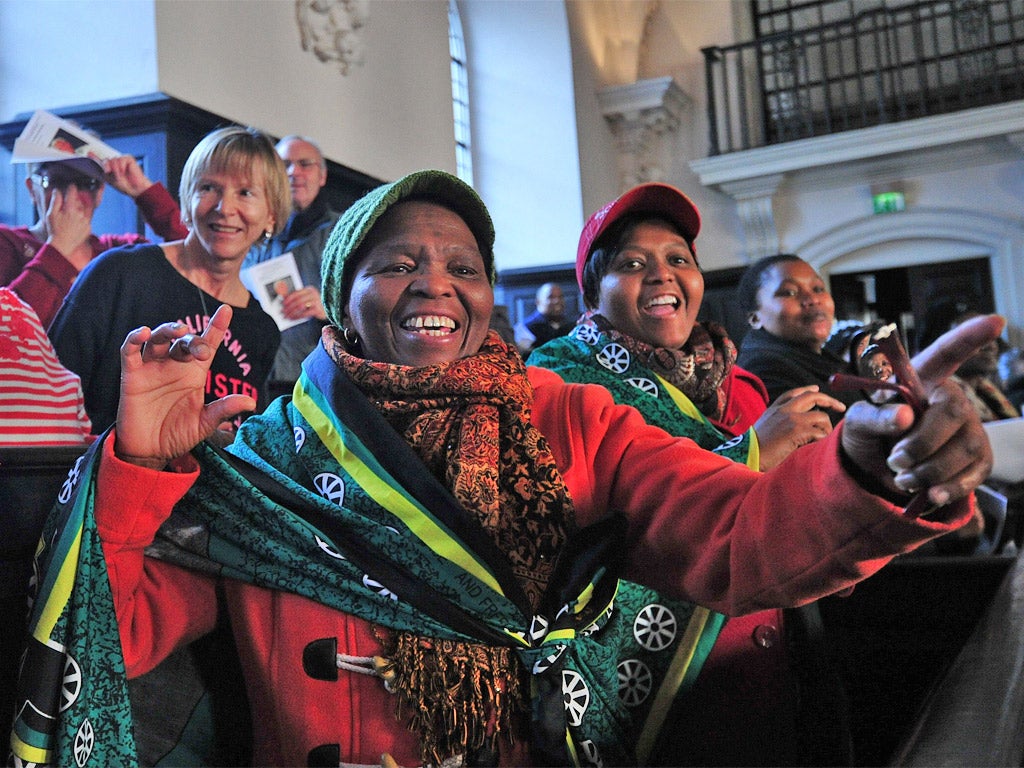Donald Macintyre's Sketch: Little South Africa comes to a church in London

Your support helps us to tell the story
From reproductive rights to climate change to Big Tech, The Independent is on the ground when the story is developing. Whether it's investigating the financials of Elon Musk's pro-Trump PAC or producing our latest documentary, 'The A Word', which shines a light on the American women fighting for reproductive rights, we know how important it is to parse out the facts from the messaging.
At such a critical moment in US history, we need reporters on the ground. Your donation allows us to keep sending journalists to speak to both sides of the story.
The Independent is trusted by Americans across the entire political spectrum. And unlike many other quality news outlets, we choose not to lock Americans out of our reporting and analysis with paywalls. We believe quality journalism should be available to everyone, paid for by those who can afford it.
Your support makes all the difference.From the courtroom, during that historic speech, you “could hear the police dogs baying outside in the square” where two lines of police were “barring the large crowds singing in support of their heroes”.
Nelson Mandela’s closing words at the Rivonia trial have been quoted hundreds of times in the past week. But no-one had yet conjured the extraordinary atmosphere of the Pretoria Supreme Court that April day in 1964 as Joel Joffe, one of the defence lawyers at the time, did for the rapt congregation who packed the Church of St Martin-in-the-Fields for Mandela’s memorial service in London.
Lord Joffe described how Mandela had explained to the court that he helped to form the armed wing of the African National Congress (ANC) because the failure of passive resistance left “no alternative to sabotage”. And how, when he reached his concluding vision of a multiracial democracy, there was “a long pause in which you could hear a pin drop” before “he looked squarely at the judge” and declared: “It is an ideal which I hope to live for and to achieve. But if needs be, it is an ideal for which I am prepared to die.”
But this commemoration for the public – expat South Africans, black and white, as well as ordinary Britons – was anything but solemn. There was ululation, there was applause – they even clapped the sermon – and while few took up the invitation of the “MC”, a South African-born Methodist pastor, the Rev Jongi Zihle, to “dance in the aisles”, several did so in their pews. There were gospel readings in English and Xhosa.
There was “Abide With Me” as well as Mandela’s favourite hymn “Lizalis’Indinga laKho”, but the singing started with the South African national anthem “Nkosi Sikelel’ iAfrika” and ended with a medley from the wonderfully exuberant South African High Commission Choir, the day’s musical leaders with choral scholars from St Martin’s, the church that had seen so many candle-light vigils during the apartheid years.
Mama Thembi Nobadula, an ANC veteran who had been on the women’s march to the Union Buildings in Pretoria in 1956 – a small figure in a black beret with a walking stick – described in an indomitably clear voice how she joined a delegation to Mandela to complain that he was “bending over backwards to appease those who been our oppressors”. And how he had patiently explained that he did want “another drop of blood” shed and that he was “the President of South Africa and not only those who had been oppressed”.
Sir Sidney Kentridge, a member of Mandela’s defence team in the 1950s treason trials, described how, opening South Africa’s new constitutional court, Mandela remarked that the last time he had been in a court was to hear if he would be sentenced to death. “I think everyone must have thought what a different history there would have been [if he had been executed],” he said.
Sir Sidney ended with Seamus Heaney’s lines, embodied, he said, in Mandela’s presidential inauguration: “…once in a lifetime/The longed-for tidal wave/Of justice can rise up/And hope and history rhyme.”
Join our commenting forum
Join thought-provoking conversations, follow other Independent readers and see their replies
0Comments